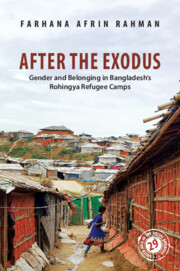Book contents
- Frontmatter
- Dedication
- Contents
- Acknowledgements
- Prologue
- 1 Introduction
- 2 Stories and Silences: On Entering and Writing Women’s Worlds
- 3 Life Under Siege: On Violence and Displacement
- 4 At Journey’s End: On Home and Belonging
- 5 Beyond Brides: On Marriage and Moral Panics
- 6 Broken Breadwinners: On Womanhood and Gender Divisions of Labour
- 7 The Price of Development: On NGOs and Gender Programming
- 8 Conclusion
- Epilogue
- Glossary
- Bibliography
- Index
1 - Introduction
Published online by Cambridge University Press: 13 November 2024
- Frontmatter
- Dedication
- Contents
- Acknowledgements
- Prologue
- 1 Introduction
- 2 Stories and Silences: On Entering and Writing Women’s Worlds
- 3 Life Under Siege: On Violence and Displacement
- 4 At Journey’s End: On Home and Belonging
- 5 Beyond Brides: On Marriage and Moral Panics
- 6 Broken Breadwinners: On Womanhood and Gender Divisions of Labour
- 7 The Price of Development: On NGOs and Gender Programming
- 8 Conclusion
- Epilogue
- Glossary
- Bibliography
- Index
Summary
Until 2017, Rohingyas – often dubbed the ‘most persecuted minority in the world’ – making the perilous trek across the border into Bangladesh were predominantly male, as they were not only denied citizenship and legal rights in Myanmar, but they also lacked economic opportunities within the country to support their families and communities (Kojima 2015; Albert 2017). On 25 August 2017, an escalation of violence in Rakhine State in Myanmar – where the Rohingyas largely resided – reached a tipping point, with horrific reports of murder and kidnapping of Rohingya men by Burmese soldiers, forced public nudity and humiliation, and sexual slavery and gang rape by military captivity directed against Rohingya women and girls. These attacks resulted in a humanitarian disaster that forced over 700,000 Rohingyas to flee their native land and seek refuge in the makeshift and overpopulated refugee camps outside of Cox's Bazaar, Bangladesh – specifically the Kutupalong– Balukhali mega-camp (used interchangeably with ‘camp’ or ‘camps’ throughout this book) – making it the largest refugee crisis in the world. Compared with past waves of refugees, there was a drastic increase in the number of women and girls crossing the border into Bangladesh. The concentration of refugees in Bangladesh's refugee camps is amongst the densest in the world, with tarpaulin and bamboo shelters precariously built on sharply sloped hillsides. There are now an estimated over 1 million Rohingya refugees living in the overcrowded and squalid camps, as the influx continued steadily over the subsequent months, with the majority of the camp's residents being women and girls (Ellis-Petersen 2019).
Unlike most debates on forced migration which focus on the larger structural needs of refugees, this book focuses on the lived experiences of Rohingya refugee women. Discussions of power relations and the reproduction of power asymmetries are often neglected in the dominant literature on refugee women's everyday subjectivities. The narratives of Rohingya women's perception of their own lives and the ways in which they negotiate, navigate, contest, and adjust to their surroundings are vital for understanding how these women forge kinship networks and learn to make a life in their new surroundings.
- Type
- Chapter
- Information
- After the ExodusGender and Belonging in Bangladesh's Rohingya Refugee Camps, pp. 4 - 16Publisher: Cambridge University PressPrint publication year: 2025

